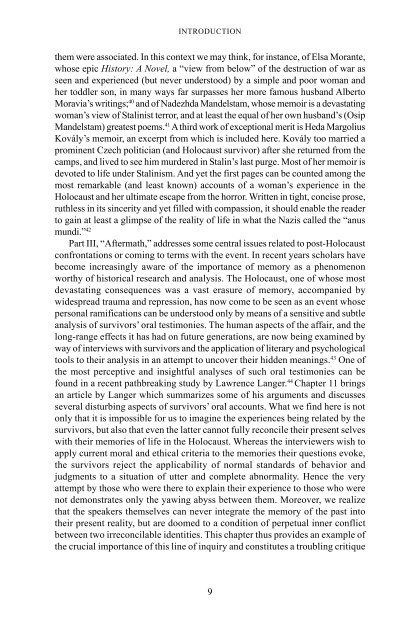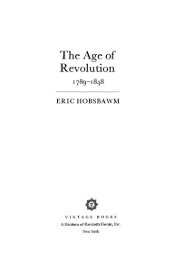The_Holokaust_-_origins,_implementation,_aftermath
The_Holokaust_-_origins,_implementation,_aftermath
The_Holokaust_-_origins,_implementation,_aftermath
You also want an ePaper? Increase the reach of your titles
YUMPU automatically turns print PDFs into web optimized ePapers that Google loves.
INTRODUCTION<br />
them were associated. In this context we may think, for instance, of Elsa Morante,<br />
whose epic History: A Novel, a “view from below” of the destruction of war as<br />
seen and experienced (but never understood) by a simple and poor woman and<br />
her toddler son, in many ways far surpasses her more famous husband Alberto<br />
Moravia’s writings; 40 and of Nadezhda Mandelstam, whose memoir is a devastating<br />
woman’s view of Stalinist terror, and at least the equal of her own husband’s (Osip<br />
Mandelstam) greatest poems. 41 A third work of exceptional merit is Heda Margolius<br />
Kovály’s memoir, an excerpt from which is included here. Kovály too married a<br />
prominent Czech politician (and Holocaust survivor) after she returned from the<br />
camps, and lived to see him murdered in Stalin’s last purge. Most of her memoir is<br />
devoted to life under Stalinism. And yet the first pages can be counted among the<br />
most remarkable (and least known) accounts of a woman’s experience in the<br />
Holocaust and her ultimate escape from the horror. Written in tight, concise prose,<br />
ruthless in its sincerity and yet filled with compassion, it should enable the reader<br />
to gain at least a glimpse of the reality of life in what the Nazis called the “anus<br />
mundi.” 42<br />
Part III, “Aftermath,” addresses some central issues related to post-Holocaust<br />
confrontations or coming to terms with the event. In recent years scholars have<br />
become increasingly aware of the importance of memory as a phenomenon<br />
worthy of historical research and analysis. <strong>The</strong> Holocaust, one of whose most<br />
devastating consequences was a vast erasure of memory, accompanied by<br />
widespread trauma and repression, has now come to be seen as an event whose<br />
personal ramifications can be understood only by means of a sensitive and subtle<br />
analysis of survivors’ oral testimonies. <strong>The</strong> human aspects of the affair, and the<br />
long-range effects it has had on future generations, are now being examined by<br />
way of interviews with survivors and the application of literary and psychological<br />
tools to their analysis in an attempt to uncover their hidden meanings. 43 One of<br />
the most perceptive and insightful analyses of such oral testimonies can be<br />
found in a recent pathbreaking study by Lawrence Langer. 44 Chapter 11 brings<br />
an article by Langer which summarizes some of his arguments and discusses<br />
several disturbing aspects of survivors’ oral accounts. What we find here is not<br />
only that it is impossible for us to imagine the experiences being related by the<br />
survivors, but also that even the latter cannot fully reconcile their present selves<br />
with their memories of life in the Holocaust. Whereas the interviewers wish to<br />
apply current moral and ethical criteria to the memories their questions evoke,<br />
the survivors reject the applicability of normal standards of behavior and<br />
judgments to a situation of utter and complete abnormality. Hence the very<br />
attempt by those who were there to explain their experience to those who were<br />
not demonstrates only the yawing abyss between them. Moreover, we realize<br />
that the speakers themselves can never integrate the memory of the past into<br />
their present reality, but are doomed to a condition of perpetual inner conflict<br />
between two irreconcilable identities. This chapter thus provides an example of<br />
the crucial importance of this line of inquiry and constitutes a troubling critique<br />
9



